
The Church of San Zaccaria is a 15th-century former monastic church in central Venice, Italy. It is a large edifice, located in the Campo San Zaccaria, just off the waterfront to the southeast of Piazza San Marco and St Mark's Basilica. It is dedicated to St. Zechariah, the father of John the Baptist.
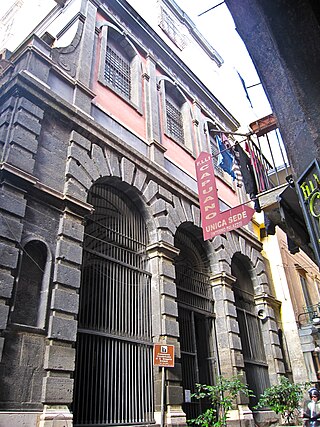
San Gregorio Armeno is a church and a monastery in Naples, Italy. It is one of the most important Baroque complexes in Naples. The church is located on a street of the same name just south of Via dei Tribunali and a few blocks south of the church of San Paolo Maggiore, Naples

The Abbey of San Giovanni in Venere is a monastery complex in the comune of Fossacesia, in Abruzzo, central Italy. it is located on a hill facing the Adriatic Sea, at 107 m over the sea level.

San Giovanni degli Eremiti is an ancient former monastic church located on Via Benedettini #19 in the ancient quarter of Albergaria of the city of Palermo, region of Sicily, Italy. It is about two blocks south from the Palazzo dei Normanni, adjacent to the church of San Giorgio in Kemonia. While the interior is virtually devoid of decoration or furnishings, the red Norman-Byzantine domes, the medieval cloister ruins, and garden make this small church a symbol of ancient Palermo.
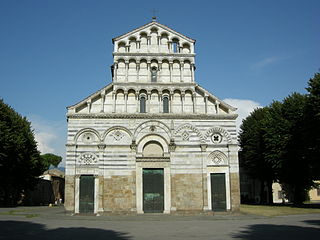
San Paolo a Ripa d'Arno is a Roman Catholic church in Pisa, region of Tuscany, Italy. It is a pre-eminent example of Tuscan Romanesque church architecture. The church is also locally known as Duomo vecchio.

San Benedetto is a late-Baroque architecture, Roman Catholic church and former Benedictine monastery in the city Catania, Sicily, southern Italy. The church facade faces Via Crociferi, parallels across via San Benedetto the former-Jesuit church of San Francesco Borgia, and both are about a block south along Crociferi from the church and convent of San Giuliano. Entrance to church and monastery appear to be through Piazza Asmundo #9 near the apse of the church.

San Giovanni Evangelista is a church in Parma, northern Italy, part of a complex also including a Benedictine convent and the San Giovanni Old pharmacy.

San Procolo is an early Gothic-style, Roman Catholic church and former monastery-hospital located on Via Massimo D'Azeglio #52 in central Bologna, region of Emilia Romagna, Italy.

San Domenico is a Baroque-style Roman Catholic church, located on Piazza San Domenico, and located in the ancient quarter of La Loggia, in central Palermo, region of Sicily, Italy. Piazza San Domenico opens to Via Roma a few blocks south of the large Palazzo delle Poste, and a few blocks north of Sant'Antonio Abate and Teatro Biondo, is the northern border of the warren of alleys of the Vucciria neighborhood. The church houses the burial monuments of many notable Sicilians, and is known thus as the Pantheon of illustrious Sicilians.

The Church of Saint Mary of Pity is a Baroque church of Palermo. It is located at the corner of Via Alloro and Via Torremuzza in the quarter of the Kalsa, within the historic centre of Palermo.

Santa Caterina d'Alessandria or Saint Catherine of Alexandria is a Roman Catholic church with a main facade on Piazza Bellini, and a lateral Western facade facing the elaborate Fontana Pretoria, in the historic quarter of Kalsa in the city of Palermo, region of Sicily, Italy. In front of the main facade, across the piazza Bellini, rise the older churches of San Cataldo and Santa Maria dell'Ammiraglio, while across Piazza Pretoria is the Theatine church of San Giuseppe and the entrance to the Quattro Canti. Refurbished over the centuries, the church retains elements and decorations from the Renaissance, Baroque, and late-Baroque (Rococo) eras. This church is distinct from the Oratorio di Santa Caterina found in the Olivella neighborhood.
Santa Maria delle Rose is a Baroque-style, Roman Catholic church located in the town of Sant'Angelo in Pontano, province of Macerata, region of Marche, Italy.
The Monastery of San Giuseppe is a Roman Catholic cloistered female convent located in Via Regina Margherita #8 at the town limits of Mogliano, province of Macerata, in the region of Marche, Italy.

San Giuliano is a Roman Catholic church and attached convent located on Via Crocifero #36 of Catania, Sicily, southern Italy. It stands across from the Collegio dei Gesuiti, whose church of San Francesco Borgia also faces Crociferi. Two blocks north on Crociferi is the baroque church of San Camillo de Lellis.
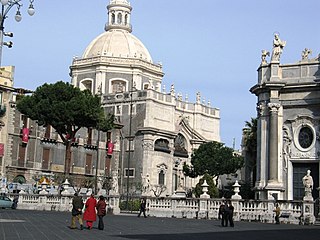
Badia di Sant'Agata or Abbey of St Agatha refers to an 18th-century Roman Catholic church and attached female convent located on Via Vittorio Emanuele #182 in the center of Catania, region of Sicily, southern Italy. The Baroque style church facade is across the street from the left transept of the Cathedral of Catania.
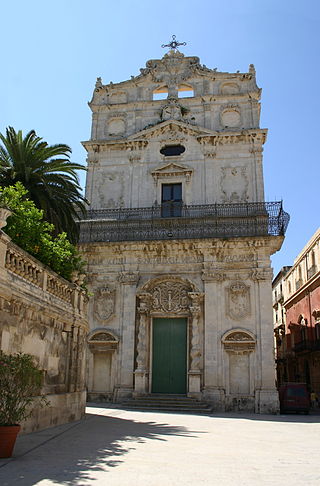
Santa Lucia alla Badia is a baroque-style, Roman Catholic church, now deconsecrated, located on the south corner of the piazza duomo, located to the south of the facade of the Cathedral of Syracuse), located in the island of Ortigia, the historic city center of Siracusa in Sicily, Italy. The church building and adjacent former monastery is now used for special exhibitions and functions.

San Filippo Neri is a baroque-style, Roman Catholic church located on via Vittorio Veneto, facing seaside, on the island of Ortigia, in the historic city center of Siracusa in Sicily, Italy.
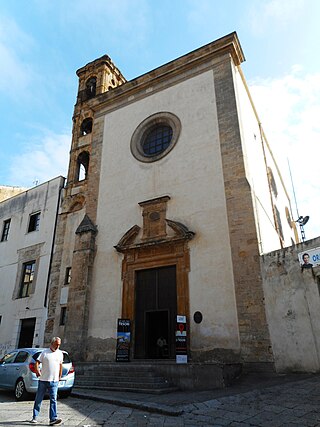
Santa Chiara all'Albergaria refers to a church and former monastery located in piazza Santa Chiara, in the quarter of Albergaria in the city of Palermo, region of Sicily, Italy. The church is located near the busy outdoor Ballarò marketplace.

San Nicola da Tolentino, or more in non-dialect known as the church Saint Niccolò da Tolentino, is a Roman Catholic church located on via Maqueda #157, between via dei Calderai and via Giardinaccio, at the Southwest border of the quarter of Kalsa (Tribunali) of the historic centre of Palermo, region of Sicily, Italy.
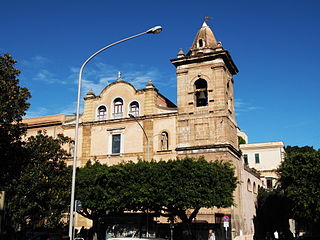
San Francesco di Paola is a 16th-century Roman Catholic church and monastery, located on Via Carini corner Piazza San Francesco di Paola, in Palermo, region of Sicily, Italy.


















